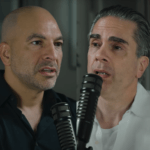I read an interesting article by David Brooks last week in the New York Times— “The Moral Peril of Meritocracy” — with the subhed: “Our individualistic culture inflames the ego and numbs the spirit. Failure teaches us who we are.” It turns out this is an essay adapted from his new book, The Second Mountain: The Quest for a Moral Life.
The article really spoke to me, as someone who is trying very hard to navigate the two mountains in my own life. A few days after reading it I bought a copy on Audible (all that zone 2 cardio I do on a bike — 3 hours/week — is perfect for podcasts and audiobooks). Thirty minutes into the audiobook, I thought to myself, I’m going to want to read this more closely…better get the physical book, too (I do this for about 5-10% of the books I buy on Audible when I really want to read and reread). So then, while still on my bike, I went to Amazon to buy a paper copy.
But a “funny” thing happened in the bargain. When I got to the landing page and was ready to click “Buy Now,” I noticed that the book had 4 reviews and the average review was 1-star. In fact, all 4 reviews were 1-star reviews (there’s no 0-star—this is the worst ranking a product can get). So I read the reviews, of course, and I was sort of stunned to realize that 1) it seemed not one of the 1-star reviewers had actually read the book (seems like that ought to be a reasonable concept, you know, reading a book before reviewing it!), but more importantly, 2) they all had something in common: a view that Brooks was in no position to write this book because of his recent divorce and the “immorality” that surrounded it.
I have a very different point of view, and was tempted to respond to the four (at the time, the only four) reviewers. But then I decided to make it the topic of today’s email instead. I wanted to respond along the lines of: First, be careful about attacking the argument versus attacking the person making the argument(the ad hominem approach is a popular one). Second, though I have not finished the book yet, I don’t get the sense Brooks is writing this book from a moral high ground. In fact, he speaks openly about how this book represents a journey he took through the darkest chapter of his life — something he seems to take responsibility for. Third, and perhaps most importantly, as someone who has made more mistakes in life than I can count, both “moral” and otherwise, I find it sad for the person who writes such scathing reviews in that they can’t try to see the world through the lens of someone else. None of us know what David or his ex-wife actually went through. (He comments in the introduction that they have mutually agreed to never speak about it publicly.)
Each of us has a choice when we encounter a “bad person” (clearly the view of the reviewers who ripped David apart). Do we want to learn from them, if they are willing to share their pain, their lessons? Or do we want to discount everything they say because they say it? Do we believe in redemption if the “sinner” seeks redemption? Or is the doer of bad deeds eternally cast out?
Parenthetically, this notion of redemption and rehabilitation over retribution was never more clear to me than when I spent a day in a maximum security prison, an experience I discuss with my friend, Corey McCarthy in this podcast.
I hope to interview David Brooks on The Drive. His book, The Road to Character, spoke to me at the most difficult moment of my life, and I can already appreciate, only halfway through it, that, The Second Mountain, will have a lasting impact on me.
– Peter





